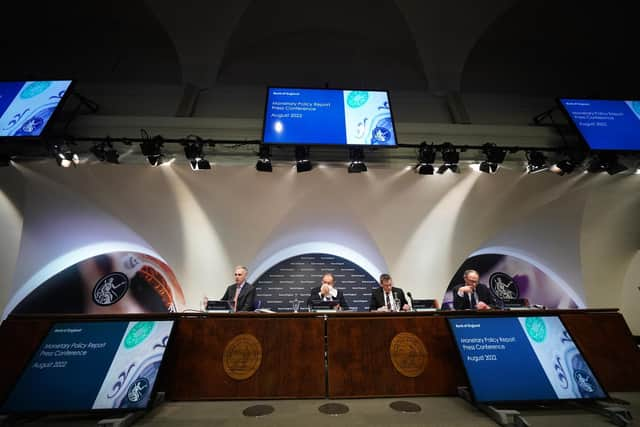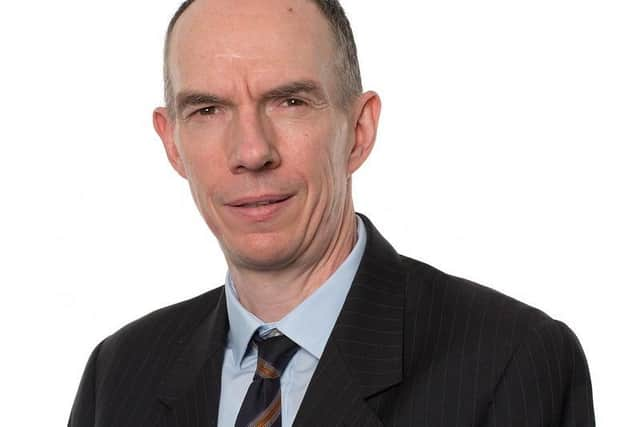Bank of England is determined to stop high inflation becoming embedded in UK economy, says Sir Dave Ramsden
Sir Dave Ramsden, Deputy Governor for Markets and Banking at the Bank of England, made the comments as he visited Leeds as part of a fact-finding tour which involved meeting local business leaders.
On Thursday, the Bank’s Monetary Policy Committee forecast inflation peaking at 13.3% in October, the highest for more than 42 years.
Advertisement
Hide AdAdvertisement
Hide AdIn an interview with The Yorkshire Post today, Sir Dave stressed that the Bank is determined to stop high inflation becoming a persistent problem for the UK economy, as it had been during parts of the 1970s and 1980s.


He said "shocks that have been hitting the economy during but also as we come out of the pandemic, particularly energy price shocks" are squeezing household budgets.
He added: "As we look ahead and see the impact of the very sharp increases we have very recently seen in energy prices; that's going to be an even bigger squeeze on household incomes.
"We are forecasting that the UK economy is going to go into recession from the end of this year.,'' he added.
Advertisement
Hide AdAdvertisement
Hide Ad"That's been driven primarily by these higher energy prices. We've seen wholesale gas prices double just since we last published a forecast in May. It's unprecedented increases.


"If you look at what the Gas Futures price is forecast to be at the end of this year, it's seven times higher than the prediction for it this time last year.
Sir Dave said: "That matters because it feeds through into the energy prices that households pay, through their domestic energy bills.
"We heard yesterday about the change in the methodology from Ofgem on the back of those energy price increases,'' he added. "Our estimate is that typical household energy bills are going to go up from £2,000 or so this April just past to £3,500. That's almost three times higher than what it was last October.
Advertisement
Hide AdAdvertisement
Hide Ad"That's a huge shock to households and that is going to impact on the economy because they are going to have less money to spend on other things.
"That is going to be the key driver, we are forecasting, that will put the UK economy into recession."
"The MPC are absolutely focused on getting inflation back to the two per cent target,'' he said. "We're obviously having to deal with these energy shocks which are the key driver of why inflation is so much above target.
"It's 9.4 per cent in the latest numbers for June. We're forecasting it's going to peak at 13.3 per cent."
Advertisement
Hide AdAdvertisement
Hide AdSir Dave said there was a lot of uncertainty around what was going to happen to energy prices once we get through the remainder of this year.
He added: "We know what's going to happen to household energy bills in October. The latest increases in energy prices were very much driven by, originally, Russia's invasion of Ukraine and now by the constraint on supplies to Europe which Russia is imposing. So there's great uncertainties about what happens next in energy markets.
"On our base line forecast, which takes the rise in energy prices for the next six months, and then assumes energy prices stay flat, inflation starts to fall through next year.
"This time next year, inflation is still high at over nine per cent, but we think it will be falling; by the end of next year it's five per cent and then it's back at the target of two per cent in two years' time in the summer of 2024.
Advertisement
Hide AdAdvertisement
Hide Ad"That's an uncomfortably long period for inflation to be high. We are taking monetary policy actions - yesterday we put up interest rates by 50 basis points - that's the sixth successive rise in interest rates. So they've gone up to 1.75 per cent.
"For those that are borrowing that makes it more expensive. We understand that adds to the challenges that households and businesses are facing. But we need to do that to ensure that high inflation doesn't become persistent in the economy; it doesn't become embedded.
"We're trying to guard against, if you like, an inflationary mentality developing,'' Sir Dave said.
"Households and businesses are experiencing very high inflation at the moment and are going to go on experiencing high inflation according to our forecasts.
Advertisement
Hide AdAdvertisement
Hide Ad"But that mustn't become embedded into their thinking about the economy. It's really important that doesn't become the norm.
"That's why, by tightening policy, I'll be honest, we're having to add to the challenges that businesses and households are facing. But we need to do that to stop inflation from becoming persistently higher."
Sir Dave stressed that inflation had averaged two per cent since 1997 and the Bank is determined to stop high inflation becoming a persistent problem.
He added: "That's why we took the forceful action that we took yesterday; the largest increase in Bank rate since we were given independence, because if we don't take that action and inflation does become embedded, that will be worse for households and businesses, particularly those low income households who have been hardest hit at present, because they are less able to respond to that high inflation and less able to deal with it."
Advertisement
Hide AdAdvertisement
Hide AdHe said the labour market remained tight and there was evidence recruitment is really challenging, although not as difficult as it might have been a few months ago.
"We have to make sure that higher inflation doesn't become embedded into the Yorkshire economy or the UK economy.
"What is really striking about this period is that you get different messages from different sectors," Sir Dave said. "A lot of manufacturers are still seeing decent demand for their exports, although the world economy is slowing, it's still growing relative to the pandemic period. Often they are facing supply chain constraints or experiencing higher energy prices.
He added: "Among the professional services businesses I was talking to this morning, their customers are recognising that things are challenging now, particularly for those who have really been challenged by the very big increases we are already seeing in the cost of living.
Advertisement
Hide AdAdvertisement
Hide Ad"Consumer facing businesses - those businesses who directly do business with households - are already seeing more challenging economic times ahead.
He continued: "But at the moment, many businesses, including manufacturing, are still seeing good economic conditions, although they are worried about the future because they can see what's coming as energy prices continue to rise, but they are also still experiencing the recovery from the pandemic .
"It's a really unusual period in that sense,'' he said. "It's certainly not a picture where every business is saying things are very difficult at the moment and are getting worse. Some businesses are still doing really well."
Sir Dave joined the Bank in 2017. He is responsible for oversight of Markets, Banking Payments and Innovation, and Resolution directorates. He is a member of the Monetary Policy Committee, the Financial Policy Committee and the Prudential Regulation Committee